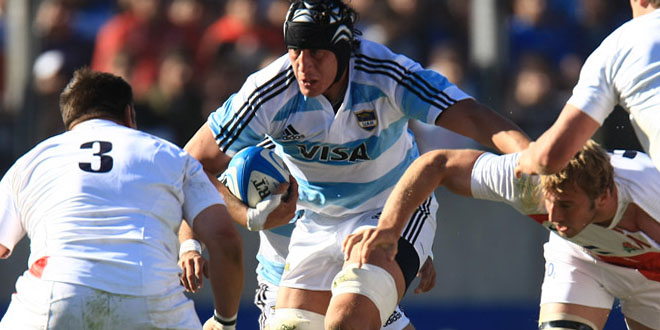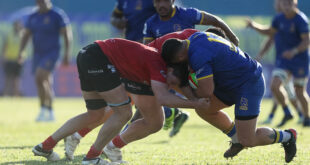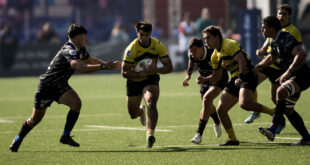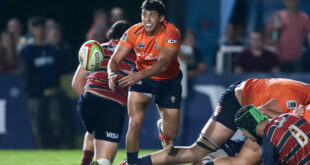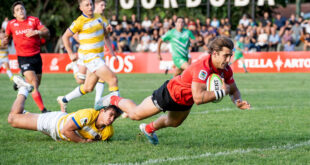Argentina’s Patricio Albacete is ending his playing career at the age of 37. With it he leaves behind a legacy that helped transform Los Pumas into a force and saw him winning titles in Europe.
Standing in at 2.00m (6ft-7) and weighing 123kg (270lbs) Albacete had the ideal frame of a second-rower. His abilities to play in the position were among the best of all second-rowers in the set-piece and in general play. His tackling was ferocious, a player with a perfect technique and commitment that was noted by his teammates and opponents.
Yet, despite excelling, in all the areas asked of from a modern lock Albacete’s talents extended even further. He was such a tremendous player was his contributions in the loose. He would win turn-overs, doing so by playing like a flanker. Albacete had it all.
Stage 1 – 2003
Having been a stand-out performer in his youth, Albacete would captain Argentina at both u19’s and u21’s. He did so for the former after having played for the senior side of Club Manuel Belgrano aged 18.
Aged 22 Albacete’s career would explode. He would make his test debut against Paraguay in April 2003 and impress Marcelo Loffreda to the extent that he would start him against France two months later and ultimately take him to RWC 2003.
At RWC 2003 Albacete would have the honor of starting in the tournament opener against hosts Australia. He proved to be a player with a highly promising future and would move to France post tournament.
His professional career would begin with Colomiers before continuing with Pau for two seasons and then Toulouse in 2006. He would remain at Toulouse until 2018 before finishing his career with one season at Racing 92.
In Toulouse colors Albacete would complete the club double. He won three Top 14 titles (2008, 2011, and 2012) and also the European Champions Cup (2010). This was in addition to numerous other finals appearances.
Stage 2 – 2007
Toulouse quickly made Albacete one of their own. Argentina benefited from this extremely. The club oversaw the shaping of Pato into Argentina’s stand-out forward over the coming years.
RWC 2007 would be Albacete’s second of three RWCs. In the tournament he would start in all of Argentina’s 7 matches. His return, in terms of points, was a try against Georgia.
Albacete’s score against the Lelos would be Albacete’s only try for Los Pumas. But scoring tries was not his job. To the contrary his job was to give go-forward ball for his team, and to complicate matters for the opposition.
His try in Lyon at RWC 2007 involved a hand-off. Yet when asked about his favorite moments for Los Pumas several years ago the try did not feature in the equation. Albacete instead noted two matches – the Bronze Final win over France and the Quarter Final win over Scotland.
Against the Scots Albacete put-in an inspiring performance. It was one for students of the game to follow closely. A feature of his match came in the 49th minute when he would win two turn-overs within a minute for Argentina.
One required him returning to stop a Scotland advance and the other saw him getting over the ball as the first man following a tackle. Very different situations, different skills but the same outcome.
Santiago Phelan would replace Marcelo Loffreda in 2008. This saw Albacete now being coached by a RWC 2003 teammate. He would be a senior player based on being a permanent starter for France’s best club at the time, and due to changes within the camp.
Argentina had lost key players to retirement. Many forwards would retire following RWC 2007, leaving Phelan with a much changed side come 2011. Forwards retiring were Rimas Alvarez Kairelis, Santiago González Bonorino, Martín Durand, Omar Hasan, Ignacio Fernández Lobbe, Gonzalo Longo, Lucas Ostiglia, and Martín Schusterman.
At RWC 2011 the surviving forwards were Albacete, Marcos Ayerza, Juan Martín Fernández Lobbe, Mario Ledesma, Juan Manuel Leguizamón, Rodrigo Roncero, and Martín Scelzo.
Getting from one RWC to the next was complex with retirements, injuries and depth all playing their part. Albacete was a constant. In 2009 he would defeat England at home but it was his performance in the November defeat in London which stood out.
So plagued were Los Pumas at the time that Phelan had an emergency flanker duo of Tomás Leonardí and Alejandro Abadie. Remarkably Argentina came close to upsetting the hosts. Central to their performance was Albacete.
Tribute to Albacete came from Loffreda. Back in Argentina from the Leicester Tigers he was asked about his time with Los Pumas. Who were the best players spotted young who developed into top talent? He made no hesitation in naming two – Juan Martín Hernández and Patricio Albacete.
Stage 3 – 2011
Injuries would continue right up to and into RWC 2011 for Argentina. Out prior or during were 2007 players Felipe Contepomi, Juan Martín Hernández, Juan Martín Fernández Lobbe, Rodrigo Roncero, and Gonzalo Tiesi. All of them were regarded as being starters for their country upon being injured.
This took place while Argentina was involved in the Pool of Death. Getting out of the pool was the task and a strong start against England in Dunedin gave them hope. But injuries meant they would take-on Romania without the luxury of resting players.
Albacete again played in all of Los Pumas’ RWC games in 2011. His second half against Scotland was a performance that lay the basis for the unlikely, yet brilliant, try to be scored by Lucas González Amorosino. Pato would seal the result by making a turnover.
Stage 4 – 2013
Post RWC 2011 Albacete retained his spot as Argentina’s no 5. He would do so right up until his final test match in 2013. It was against Wales in Cardiff and was the second match under the new coaching regime of Daniel Hourcade.
An off-field disagreement between Albacete and Hourcade cut short his test career. Pato finished with 57 caps, a number which would have been many more had Argentina been in the Rugby Championship prior to 2012.
It is fair to say that Albacete would have played in the Rugby Championship from 2003-2011 had it included his country. As such he would have reached the 100 cap mark before his dispute arose with Hourcade.
Albacete is now expected to officially announce his retirement shortly. He told Radio Metro 95.1 that he has to make it official but it is confirmed that he will announce his retirement.
 Americas Rugby News Rugby news from across the Americas!
Americas Rugby News Rugby news from across the Americas!
